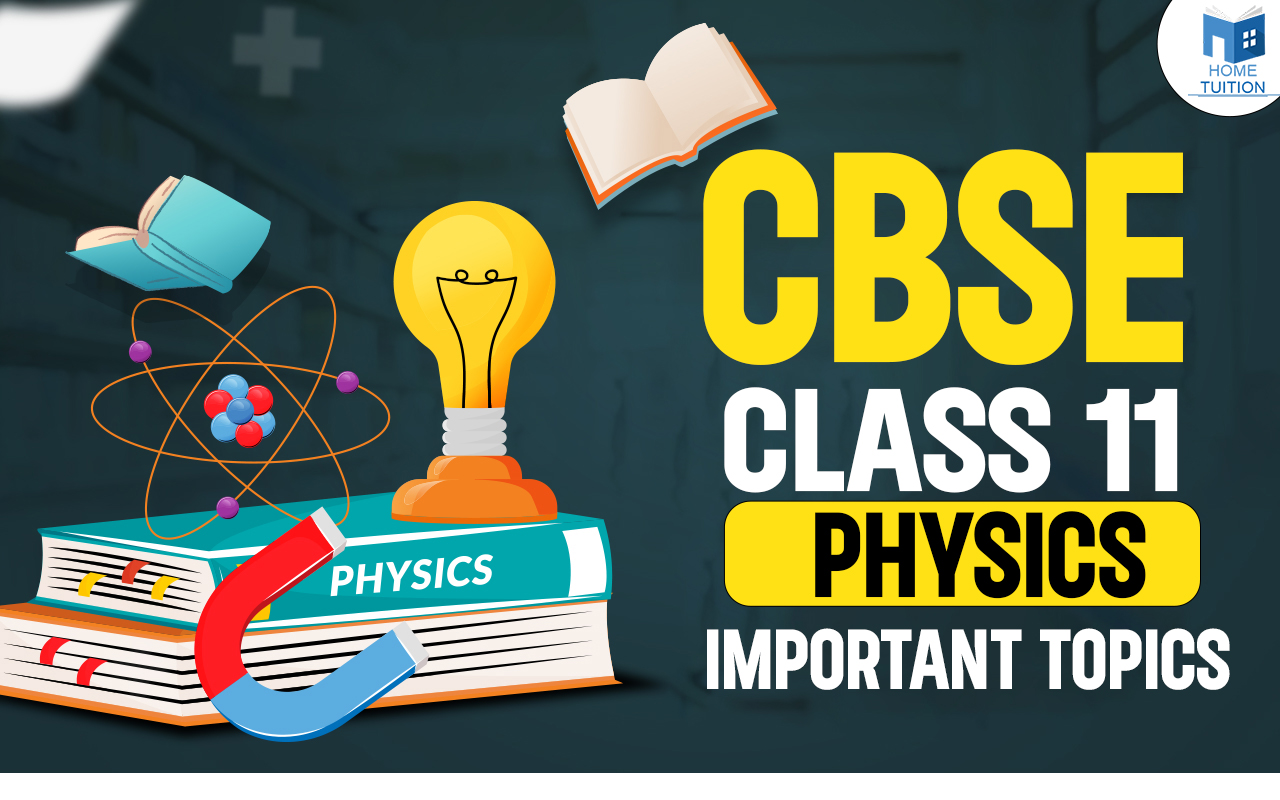CBSE Class 11 Physics Important Topics
Class 11 plays a crucial role in a student’s academic journey. To perform well in the CBSE Class 12 Board Exams, it is essential to focus on key topics from Class 11 Physics. Physics is not only vital for board exams but also for competitive exams like IIT JEE and NEET. Many popular engineering and medical entrance tests include the Class 11 Physics syllabus. Students must grasp the fundamental concepts of physics and learn how to apply them in different contexts. This approach enhances their logical thinking and analytical skills. When preparing for the Class 11 CBSE Physics exam, students should be mindful of several important aspects. Along with dedication, having an effective study plan is critical. Below are some useful tips for preparing for the CBSE Class 11 Physics exam.

Important Topics of Physics Class 11
Here are some important topics for Class 11 Physics:
1. Physical World
- Scope and excitement of Physics
- Nature of physical laws
2. Units and Measurements
- SI units
- Accuracy and precision of measuring instruments
- Errors in measurement
- Significant figures
- Dimensions of physical quantities
- Dimensional analysis
3. Motion in a Straight Line
- Position, path length, displacement
- Average velocity, instantaneous velocity
- Uniform and non-uniform motion
- Relative velocity
- Graphical representation of motion
- Equations of motion for uniformly accelerated motion
- Acceleration due to gravity
4. Motion in a Plane
- Scalars and vectors
- Vector addition and subtraction
- Resolution of vectors
- Motion in a plane with constant acceleration
- Projectile motion
- Uniform circular motion
5. Laws of Motion
- Concept of force
- Newton’s laws of motion
- Inertia, mass, and momentum
- Conservation of linear momentum
- Friction (static and kinetic)
- Circular motion, centripetal force
6. Work, Energy, and Power
- Work done by constant and variable force
- Kinetic energy, work-energy theorem
- Power
- Potential energy
- Conservation of mechanical energy
- Collisions (elastic and inelastic)
7. System of Particles and Rotational Motion
- Center of mass
- Motion of center of mass
- Torque and angular momentum
- Equilibrium of a rigid body
- Moment of inertia
- Theorems of perpendicular and parallel axes
- Rolling motion
8. Gravitation
- Kepler’s laws of planetary motion
- Universal law of gravitation
- Gravitational constant
- Gravitational potential energy
- Escape speed
- Satellites, orbital velocity
- Geostationary and polar satellites
9. Mechanical Properties of Solids
- Elasticity, stress, strain
- Hooke’s Law
- Modulus of elasticity (Young’s, Bulk, and Shear)
- Poisson’s ratio
10. Mechanical Properties of Fluids
- Pressure in a fluid
- Pascal’s law
- Atmospheric pressure, gauge pressure
- Archimedes’ principle
- Bernoulli’s theorem
- Viscosity
- Surface tension and its applications
11. Thermal Properties of Matter
- Heat, temperature, thermal expansion
- Specific heat, calorimetry
- Heat transfer: conduction, convection, radiation
- Newton’s law of cooling
12. Thermodynamics
- Thermal equilibrium, zeroth law of thermodynamics
- First law of thermodynamics
- Specific heat capacities of gases
- Thermodynamic processes (isothermal, adiabatic, etc.)
- Second law of thermodynamics
- Reversible and irreversible processes
- Carnot engine
13. Kinetic Theory
- Assumptions of kinetic theory of gases
- Pressure of an ideal gas
- Kinetic interpretation of temperature
- Degrees of freedom
- Law of equipartition of energy
- Specific heat capacity of gases
- Mean free path, Brownian motion
14. Oscillations
- Periodic and oscillatory motion
- Simple harmonic motion (SHM)
- Energy in SHM
- Oscillations of a spring, simple pendulum
- Free, damped, and forced oscillations
- Resonance
15. Waves
- Types of waves (transverse, longitudinal)
- Wave motion, speed of a wave
- Principle of superposition
- Reflection of waves
- Standing waves
- Beats
- Doppler effect
FAQs
- Laws of Motion.
- Work, Energy, and Power.
- Rotational Motion.
- Thermodynamics.
- Oscillations and Waves.
- Electrostatics.
- Magnetism.
- Optics.
The Class 11 Physics syllabus is tough. It's filled with complex concepts, tricky formulas, and problems that could challenge even Einstein. From waves and optics to magnetism and electricity, it's a diverse and demanding journey.
Practising the previous year's question papers and sample papers is an excellent way to prepare for the exam.
Rotational Motion, Waves, Thermodynamics, System of Particles and Rotational Motion and Gravitation are the hardest chapter in class 11 physics.
- Assign Enough Time To Each Subject. ...
- Focus on NCERT Books. ...
- Know Where You Lack in Your Studies. ...
- Prepare Short Notes. ...
- Focus On Your Writing Skills. ...
- Find Out Topics With High-Weightage. ...
- Revision is Important. ...
- Avoid Reading the Night Before the Exam.
Recent Blogs
- What is Mathematical Olympiads?
- Indian Air Force Group X and Y Exam
- Difference between CSIR NET and UGC NET
- India Post GDS Recruitment 2025
- MAH MBA Exam
- MP TET 2022 Exam
- Top MBA Colleges in India
- MCQ on On the Trail of the Earliest People
- Roles of Tutoring and Tuitions
- Why you need a good Tutor
- Online teaching: The role of parents
- Technology with traditional teaching?
- How to maximize your child’s potential?
- How to reduce stress?
- What makes a good tutor?